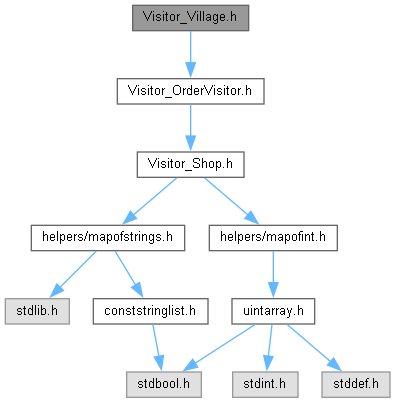Declaration of the Village structure and its supporting functions, Village_Initialize(), Village_Clear(), Village_Load(), Village_AddShop(), and Village_VisitShop(), as used in the Visitor Pattern. More...
#include "Visitor_OrderVisitor.h"

Go to the source code of this file.
Classes | |
| struct | Village |
| Represents a collection of shops that can be visited. More... | |
Macros | |
| #define | __VISITOR_VILLAGE_H__ |
Typedefs | |
| typedef struct Village | Village |
| Represents a collection of shops that can be visited. | |
Functions | |
| void | Village_Initialize (Village *village) |
| Initialize the specified Village object. | |
| void | Village_Clear (Village *village) |
| Clear the specified Village object, releasing any allocated memory associated with the village and its contents. The Village object is left in an newly-initialized state. | |
| bool | Village_Load (Village *village) |
| Set up the specified Village object with all the shops that can be visited. | |
| bool | Village_VisitShop (Village *village, OrderVisitor *visitor) |
| Visit all shops in the given Village object to find the ingredients specified in the OrderVisitor object. | |
Detailed Description
Declaration of the Village structure and its supporting functions, Village_Initialize(), Village_Clear(), Village_Load(), Village_AddShop(), and Village_VisitShop(), as used in the Visitor Pattern.
Definition in file c/Visitor_Village.h.
Macro Definition Documentation
◆ __VISITOR_VILLAGE_H__
| #define __VISITOR_VILLAGE_H__ |
Definition at line 10 of file c/Visitor_Village.h.
Typedef Documentation
◆ Village
Function Documentation
◆ Village_Clear()
| void Village_Clear | ( | Village * | village | ) |
Clear the specified Village object, releasing any allocated memory associated with the village and its contents. The Village object is left in an newly-initialized state.
- Parameters
-
village The Village object to clear.
Definition at line 72 of file Visitor_Village.c.
References Shop_Destroy(), Village::shops, Village::shops_count, and Village_Initialize().
Referenced by Visitor_Exercise().
◆ Village_Initialize()
| void Village_Initialize | ( | Village * | village | ) |
Initialize the specified Village object.
- Parameters
-
village The Village object to initialize.
Definition at line 59 of file Visitor_Village.c.
References Village::Name, Village::shops, and Village::shops_count.
Referenced by Village_Clear(), and Visitor_Exercise().
◆ Village_Load()
| bool Village_Load | ( | Village * | village | ) |
Set up the specified Village object with all the shops that can be visited.
- Parameters
-
village The Village object to load.
- Returns
- Returns true if the Village object was loaded successfully; otherwise, returns false, indicating an out of memory condition (or a NULL argument).
Definition at line 88 of file Visitor_Village.c.
References Visitor_Shop::IngredientsForItems, MapOfStrings_AddArray(), Village::Name, Shop_Create(), Shop_Destroy(), and Village_AddShop().
Referenced by Visitor_Exercise().
◆ Village_VisitShop()
| bool Village_VisitShop | ( | Village * | village, |
| OrderVisitor * | visitor | ||
| ) |
Visit all shops in the given Village object to find the ingredients specified in the OrderVisitor object.
- Parameters
-
village The Village object whose shops are to be visited. visitor The OrderVisitor object describing what is being ordered.
- Returns
- Returns true if the order was placed successfully; otherwise, returns false, indicating an out of memory condition (or a NULL argument).
Definition at line 338 of file Visitor_Village.c.
References OrderVisitor_VisitShop(), Village::shops, and Village::shops_count.
Referenced by Shop_PlaceOrder(), and Visitor_Exercise().